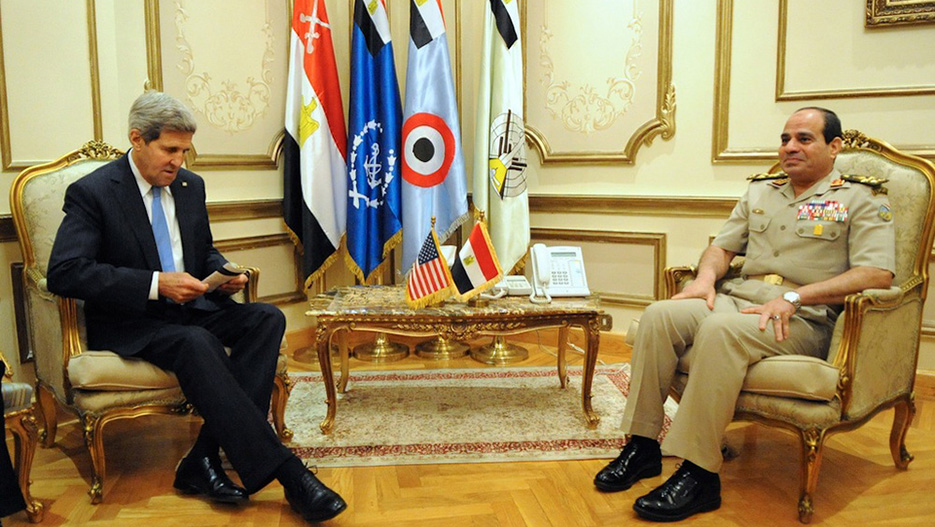Egypt continues a process of political transition
El-Sisi said in the beginning of May 2014 that people “should lower their expectations for change”; Egyptians should not expect “instant democracy or rapid economic reforms.” He further argued that shared sacrifice is a necessary condition.

Long known for its pyramids and ancient civilization, Egypt is the largest Arab country and has played a central role in Middle Eastern politics in modern times .
Egypt has been a key ally of the West and it has also played a major role in the Israeli-Arab conflict.
The politics of Egypt is based on republicanism, with a semi-presidential system of government. The 2011 uprising that swept away 30-years of Mubarak’s rule will surely enter the books as one of the most momentous events in the Arab political history. The protests were organized by loose groups of secular pro-democracy activists and they were soon joined by Islamists, liberal political parties, labor unions, and ordinary citizens hungry for change.
Following President Hosni Mubarak’s ouster in February 2011, executive power was assumed by the Supreme Council of the Armed Forces, which dissolved the parliament and suspended the constitution.
After a year of interim military rule, the first presidential elections in half a century were won by Islamist Muslim Brotherhood candidate Mohammed Morsi in 2012.
Free parliamentary and presidential elections were held and Mohammed Morsi became president with almost 52% of the vote.
In June 2013, growing dismay at the government’s actions among many Egyptians boiled over in another wave of protests.
Siding with the demonstrators, the military ousted Mr. Morsi and violently suppressed the protest sit-ins held by the Brotherhood in response .
On 26 and 27 May 2014 Egyptian voters could cast their ballots for the presidential elections. Because the turnout was low on May 26th, the government declared a national holiday on the 27th, which they had hoped would lead to a higher turnout. In the end, 47% of the country’s 54 million eligible voters voted, which was significantly lower than expected. 96.91% voted for Abdel Fattah el-Sisi .
Despite his victory, el-Sisi still has to meet expectations of the voters who currently back him and that will be a difficult task due to the amount of “poverty, unemployment and other social problems.” Being aware of the latter, el-Sisi said in the beginning of May 2014 that people “should lower their expectations for change”; Egyptians should not expect “instant democracy or rapid economic reforms.” He further argued that shared sacrifice is a necessary condition.
For el-Sisi’s supporters these statements show that he is “a decisive man of action.
Egypt’s new president seems also determined to fix Egypt’s economy, which has struggled since 2011 political crisis that turned off investors and caused tourism to collapse.
Earlier in August el-Sisi refused to sign the budget until the finance minister cut the planned deficit for the coming fiscal year from 12% to 10%. Whether the new sums add up is not clear, but already this year Egypt has introduced a tax on stock market gains and plans to bring in value-added and property taxes too.
This, plus an influx of money from Gulf countries keen on Egypt’s new regime, has led to a cautious improvement in investors’ sentiment. Last month PepsiCo and Almarai, a Saudi food company, announced they would invest $345m in an Egyptian joint venture.
Wealthy local businessmen have also announced new investments. One of them, Naguib Sawiris, has promised to spend $1 billion, though on what is uncertain. With el-Sisi being likely to bring stability, the economic picture looks rosier than it had since Hosni Mubarak’s ousting in January 2011.
As part of his new role, el-Sisi gave his first public speech calling for broad-based reconciliation among the polarized factions of the society. El-Sisi’s maintenance of the crackdown on the Muslim Brotherhood will continue to generate a backlash, including occasional terrorist attacks.
The new president also promised a series of large scale government projects to alleviate stresses in the health, education and housing sectors, and repeatedly emphasized that he intends to restore a sense of “respect for the state ”.
FAIR USE POLICY
This material (including media content) may not be published, broadcasted, rewritten, or redistributed. However, linking directly to the page (including the source, i.e. Marcopolis.net) is permitted and encouraged.